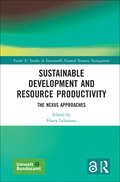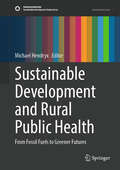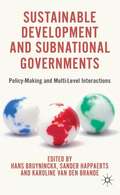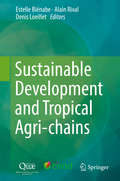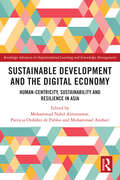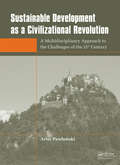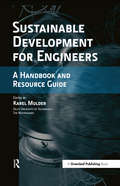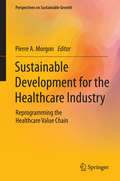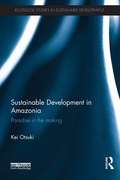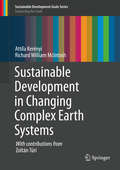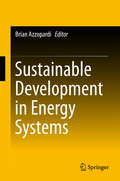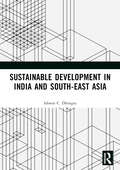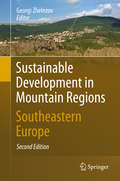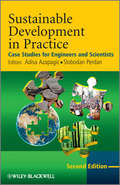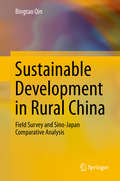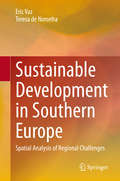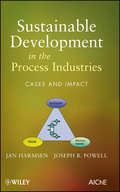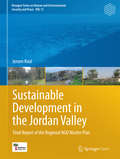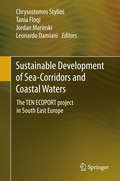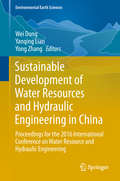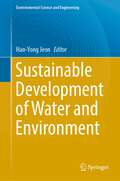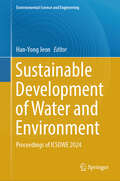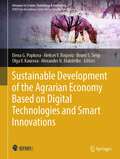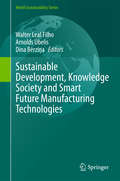- Table View
- List View
Sustainable Development and Resource Productivity: The Nexus Approaches (Factor X: Studies in Sustainable Natural Resource Management)
by Harry LehmannThe fourth Factor X publication from the German Environment Agency (Umweltbundesamt, UBA), Sustainable Development and Resource Productivity: The Nexus Approaches explores the interdependencies of sustainable development paths and associated resource requirements, describing and analysing the necessities for a more resource efficient world. The use of and competition for increasingly scarce resources are growing worldwide with current production and consumption patterns of industrialised economies soon to reach the point where the ecosphere will be overtaxed far beyond its limits. Against this background, this volume examines the important initiatives to monitor resource use at the international, EU and national level. The current trends and challenges related to sustainable resource use are discussed, including international challenges for a resource efficient world, megatrends, justice and equitable access to resources. In the second part of the book, contributions examine implementation strategies. They assess the concept known as circular economy and discuss the theory of growth and the role of the financial and education systems. The final section places special emphasis on practical examples. Overall, the book presents concrete ways and examples of achieving more sustainability in practice. Discussing solutions for a more sustainable use of natural resources, this book is essential reading for scholars and students of natural resources and sustainable development and decision-makers and experts from the fields of policy development, industry and civil society.
Sustainable Development and Rural Public Health: From Fossil Fuels to Greener Futures (Sustainable Development Goals Series)
by Michael HendryxThis book offers strategies and solutions for rural communities dependent on fossil fuel economies to enable them to transition to sustainable development. The move to renewable energy development and use is gaining global traction and will inevitably become standard practice in the coming years, and yet vulnerable communities around the world remain dependent on finite resource extraction for local economic activity. What will happen to these communities as the fossil fuel era fades away? Dependence on declining resource extraction economies arises from entrenched short-term interests in political and corporate worlds, and in the knowledge, skills and opportunities that local populations have at their disposal. The edited volume takes a public health perspective by showing how dependence on fossil fuel extraction and processing economies creates not only environmental and economic problems but also public health disparities. More importantly, rather than documentation of problems and obstacles, this book focuses primarily on solutions, on real examples happening right now in communities around the world to take charge of their futures. A series of case studies provide examples of local efforts underway in these communities to create sustainable economic alternatives to fossil fuel dependence. The final section of the volume describes theory-based and empirically grounded development priorities that are needed to make transitions achievable and long-lasting, including improvements in adolescent health and well-being, regenerative development, sustainable food systems, adult education, and community-based leadership. Finally, case studies and development priorities are integrated within a new rural development framework to guide other communities in their own transition efforts. Although the challenges are daunting, the book is ultimately optimistic and forward-looking. Sustainable Development and Rural Public Health: From Fossil Fuels to Greener Futures is essential reading for public health practitioners and researchers, social justice advocates, and students in sustainability studies, environmental justice and related areas. Rural health professionals, community leaders, environmental planners, policy makers, industry leaders, and entrepreneurs also will find this resource useful for their work.
Sustainable Development and Subnational Governments
by Hans Bruyninckx Sander Happaerts Karoline Van den BrandeThis book highlights the importance of the subnational level of governance in relation to sustainable development, exploring how subnational governments have taken up the challenge to design sustainable development policies and their involvement in international decision-making on sustainable development.
Sustainable Development and Tropical Agri-chains
by Estelle Biénabe Alain Rival Denis LoeilletThis book links tropical agri-chain dynamics - with which CIRAD and AFD have been involved for decades - to that of sustainable development. Increased environmental and social concerns urge agri-chain actors and development practitioners to design innovations, and public and private actors to invent regulations in connection with agri-chains to improve sustainability. With a view to contributing towards implementing the Sustainable Development Goals (SDGs), this book examines the different roles of agri-chains: as vectors of development, as spaces of innovation, as objects of evaluation, and as arenas of regulation. It builds upon the findings and experiences of CIRAD and its researchers together with their Southern partners, and of AFD and its officers. Linking agricultural production with the other economic sectors, agri- chains are key spaces where local and global challenges to sustainability meet and where local and global actors experiment interlinked or common solutions.
Sustainable Development and the Digital Economy: Human-centricity, Sustainability and Resilience in Asia (Routledge Advances in Organizational Learning and Knowledge Management)
by Mohammad Nabil Almunawar, Patricia Ordóñez de Pablos and Muhammad AnshariThe advancement of technology, such as data analytics and artificial intelligence (AI), has led to the birth of Industry 4.0, in which technology seems to be the centre of development. However, as the Covid-19 pandemic created havoc, the entire world production chain has been seriously affected, highlighting that machines alone, although fully connected and automated, cannot function without people. This book addresses the pillars of moving towards Industry 5.0 for sustainable development, drawing on examples from Asia. As Asian nations are moving fast toward the digital economy, this edited collection offers new perspectives on understanding emerging business opportunities as well as the challenges faced. Chapters span the three pillars of Industry 5.0, human centricity, sustainability and resilience, and includes topics related to people management for creating wealth, technology advancements in supporting creativity, resilience and agility of organisations, as well as the important issue of sustainability in future industrial development. With rich, empirical studies from leading researchers, this book will be a reference for academics and scholars across business disciplines, including information, technology and innovation management, organisational and strategic management, as well as those interested in industrial development and sustainability.
Sustainable Development as a Civilizational Revolution: A Multidisciplinary Approach to the Challenges of the 21st Century
by Artur PawlowskiAs a concept, sustainable development is in conflict with traditional development based upon economic growth. Sustainable development is an attempt to formulate a programme that integrates different aspects (ecological, social, and economical) which were usually considered as separate from each other. Sustainable Development as a Civilizationa
Sustainable Development for Engineers: A Handbook and Resource Guide
by Karel MulderIt is crucial that engineers – from students to those already practising – have a deep understanding of the environmental threats facing the world, if they are to become part of the solution and not the problem. Is there a way to reconcile modern lifestyles with the compelling need for change? Could new improved technologies play a key role? If great leaps in the environmental efficiency of technologies are needed, can they be produced? Engineers are in a privileged and hugely influential position to innovate, design and build a sustainable future. But are they engaged or uninterested? Are they knowledgeable or ignorant? This book has been developed by a number of committed educators in European engineering departments under the leadership of Delft University of Technology and the Technical University of Catalunya to meet the perceived gap between what engineers know and what they should know in relation to sustainable development. The University of Delft decided as long ago as 1998 that all of its engineering graduates, working towards careers as designers, managers or researchers, should be prepared for the challenge of sustainable development and, as such, should leave university able to make sustainable development operational in their designs and daily practices. The huge amount of knowledge gathered on best-practice teaching for engineers is reflected in this book. The aim is to give engineering students a grounding in the challenge that sustainable development poses to the engineering profession, the contribution the engineer can make to attaining some of the societal and environmental goals of sustainability, and the barriers and pitfalls engineers will likely need to confront in their professional lives. Concise but comprehensive, the book examines the key tools, skills and techniques that can be used in engineering design and management to ensure that whole-life costs and impacts of engineering schemes are addressed at every stage of planning, implementation and disposal. The book also aims to demonstrate through real-life examples the tangible benefits that have already been achieved in many engineering projects, and to highlight how real improvements can be, and are being, made. Each chapter ends with a series of questions and exercises for the student to undertake. Sustainable Development for Engineers will be essential reading for all engineers and scientists concerned with sustainable development. In particular, it provides key reading and learning materials for undergraduate and postgraduate students reading environmental, chemical, civil or mechanical engineering, manufacturing and design, environmental science, green chemistry and environmental management.
Sustainable Development for the Healthcare Industry
by Pierre A. MorgonThis volume addresses the dynamics of sustainable development in the healthcare industry, covering all major aspects, including R&D, manufacturing, regulation, market access, commercialization, and general management. Healthcare markets are evolving under demographic and economic pressures. In mature markets, patients navigate complex systems with limited control on healthcare quality and outcomes, while in developing markets, patients have limited awareness, access, and ability to pay for healthcare. The industry needs to identify which business targets are genuinely attractive for major or new investments. At the same time, development of new products and services must be tackled within the context of environmental sustainability. Rather than focusing on the traditional issues of innovation, cost management, and commercial effectiveness associated with growth, the authors explore such emerging topics as: The mutations of innovation management The need to foster patient-centricity along the entire value chain of the healthcare industry and company-wide Issues related to improving healthcare access and disease management The allocation of educational resources focused on the patient to increase the effectiveness of disease management The preservation of natural resources and the environmental effect of pollution and hazards created by the handling of pharmaceutical products Issues related to the size of medical need and/or market demand The private-public partnerships necessary to address the full spectrum of public health issues, from basic patient access to care to managing global health crises The required organizational and governance evolutions for the healthcare industry to maintain profitability and sustainable growth. Featuring contributions from leading academics and industry insiders with emphasis on environmental, economically, and socially sustainable practices, the authors present a unique, multi-faceted set of perspectives on this vital and rapidly evolving field.
Sustainable Development in Amazonia: Paradise in the Making (Routledge Studies in Sustainable Development)
by Kei OtsukiThis book argues against the assumption that sustainability and environmental conservation are naturally the common goal and norm for everyone in Amazonia. This is the first book focusing on agency, reflexivity and social development to address sustainable development in the region. It discusses the importance of looking into societal dynamics in order to deal with deforestation and sustainable development policies through the ethnography of an Amazonian settlement named New Paradise. This book demystifies utopian and overtly conservationist views that depict the Amazon rainforest as a troubled paradise. Engaging with social theory of practice with particular focus on emergentist perspectives and Foucault’s analysis of ‘heterotopia’, the author shows that Amazonia is a set of settlement heterotopias in which various local and external initiatives interact to make up real, lived-in places. The settlers’ placemaking continually rearranges power and material relations while the process usually emphasises utopian developmentalist and conservationist policy intervention. This book explores in detail how, as power relations are arranged and governance reshaped, sustainable development and construction of a green society also need to become a goal for the settlers themselves. The book’s insights on the relationship between the sustainable development frameworks used in environmental policy, and ongoing societal development on the ground inform debate both within Amazonia, and in comparable communities worldwide. It also offers institutional pathways to realise new, more engaging, policy intervention for development professionals and policy makers.
Sustainable Development in Changing Complex Earth Systems (Sustainable Development Goals Series)
by Attila Kerényi Richard William McIntoshThis book applies system theory to analyze the operation and structure of the complex earth surface system, including the interactions between society and nature that cause environmental degradation and threats to human populations. The possible ways to harmonize the operation of a global society as a complex system using the United Nation sustainable development goals are investigated, as well as the major efforts currently implemented to achieve this objective and why many are unsuccessful. Readers will learn this material through case studies that assess the essential conditions required to occupy a planet sustainably, and examine the complex interactions between society and nature in the atmosphere, hydrosphere, biosphere, and outer layers of the lithosphere. The book is written for undergraduate students in geography, earth sciences, environmental sciences, and ecology, and will also appeal to environmental agency employees, nature protection representatives, teachers, and researchers.
Sustainable Development in Energy Systems
by Brian AzzopardiPresenting the latest research on the sustainable development of energy systems, this book provides a broad and holistic perspective on various aspects of renewable energy sources and grid integration. It highlights the integration of renewable and alternative systems into existing infrastructures, and explores the synchronization of environmental and development needs with other social challenges. The research presented is supported by original illustrations and tables, and provide the basis for future research on the topic. Offering an invaluable resource to those working in sustainable development, this book is also intended for students and researchers of engineering, economics and social sciences, as well as government entities and librarians.
Sustainable Development in India and South-East Asia
by Ishwar C. DhingraIndia and the South-East Asia are typical case studies of interest for students of development economics. These countries have served as role models for most of the emerging economies. Sustainable Development in India and South-East Asia attempts to explore and analyse the nature of economic relationship between India and the South-East Asia. It assesses the prospects for this relationship to grow and flourish. Finally, it makes suggestions to strengthen and carry forward this relationship. Print edition not for sale in South Asia (India, Sri Lanka, Nepal, Bangladesh, Pakistan and Bhutan)
Sustainable Development in Mountain Regions
by Georgi ZhelezovThe mountain regions in Southeastern Europe are unique natural regions of great beauty and ecological value, and home of the head waters of major rivers. They constitute a major ecological, economic, cultural, recreational and living environment in Europe, shared by numerous cultures and countries. The Southeastern European Mountain Regions are an important reservoir for biodiversity and habitats in Europe. A great number of protected areas - national parks, nature parks, reserves and nature monuments are located in these regions. From a socio-economic point of view the mountain regions are among the poorest areas in the Southeastern European countries, but they have potential for the implementation of successful economic activities. There are opportunities for development of these regions and, in particular, for trans-border integration and co-operation. This book brings together research results from experts from all Balkan countries working on the problems of the mountain regions in Southeastern Europe. The volume focuses on the challenges taking place along the rapid transformation in land use, biodiversity, tourism, nature risk and bio-productivity due to the global changes and particularly due to the local impacts of climate change. The key questions for discussion are: - Biodiversity, nature protection and conservation - Natural disasters and risk management - Social-economical development of the mountain regions - Spatial planning in the development of the mountain regions - Sustainable practices and politics for land use - Transborder co-operation.
Sustainable Development in Practice
by Slobodan Perdan Adisa AzapagicSustainable Development in Practice: Case Studies for Engineers and Scientists, Second Edition explores the concept of sustainable development and its implications for science and engineering. It looks at how sustainability criteria can be combined with traditional scientific and engineering considerations to design and operate industrial systems in a more sustainable manner. Taking a life cycle approach to addressing economic, environmental and social issues, the book presents a series of new practical case studies drawn from a range of sectors, including mining, energy, food, buildings, transport, waste, and health.Written in an accessible style, the book opens with a general introduction to the concept of sustainable development and explores its practical implications for technical experts. Recognising that practical application of sustainable development depends on the context, the second part of the book is devoted to case studies. The case studies explore scientific and technical aspects alongside relevant environmental economic and social issues.The key features of this completely revised and updated second edition include:Twelve new chapters, including the case studies on nuclear energy, biofuels, aviation, buildings, urban transport, food, sanitation and health.Six completely revised chaptersCoverage of a wide range of sustainability issues in both developed and developing countriesIntegration of scientific and technical aspects with economic, environmental and social considerationsDiscussion of policy implicationsCommunication with the non-engaging and non-scientific audienceConsidered essential reading for all engineers and scientists concerned with sustainable development, Sustainable Development in Practice: Case Studies for Engineers and Scientists, Second Edition also provides key reading and learning materials for undergraduate and postgraduate science and engineering students.
Sustainable Development in Rural China
by Bingtao QinThe book provides a study of sustainable development in rural China. Because of its huge population and vast land area, this is an important issue not only for China but for the whole world. The research presented is both multi aspect and systematical. It can be likened to a tree where the trunk is the three main aspects: economy, environment and rural society, and the five main branches are agricultural development, industrial pollution, energy security, labor migration and social welfare, and these are the book's five main topics. The research methods of field survey and Sino-Japanese comparison will be of particular interest to readers. The field survey enables readers to become familiar with the environment of rural China. Survey reports and data provide readers with a more profound and vivid understanding of rural China and comparative methods benefit readers from different countries and a variety of cultural backgrounds. For Japanese readers or readers who understand Japanese well, they make China more easily understandable, while Chinese readers gain insights into the country's future and the direction of current developments based on a Japanese frame of reference. For readers outside China and Japan, this book serves as an introduction to Chinese society and also to Japan. Finally, the author provides various paradigmatic scenarios, including default and sustainable. After reading this book, readers will be aware that the earlier and the more we pay attention to these issues, the easier it will be for rural China to achieve a sustainable situation.
Sustainable Development in Southern Europe: Spatial Analysis of Regional Challenges
by Eric Vaz Teresa de NoronhaThis book discusses the future and present regional challenges of southern Europe, adopting a multidisciplinary perspective concerning planning, regional development, the role of innovation and sustainability of cities. It offers as such an insight into the current status quo of regional development and territorial dynamics of a region of growing world-interest.Southern Europe has significantly changed over the last decades. At a regional level, key issues such as local and regional governance, sustainability, and preservation of heritage have presided as prime directives within the umbrella of the European Union. The recession had devastating consequences on the perception and the economies of southern Europe. However, the resilience and capacity of southern Europe to reinvent itself have been shown over the last decade. Southern Europe has since antiquity been a cradle of invention, innovation, and regional development, that under adequate and visionary governance may bring a growing engine towards sustainability.
Sustainable Development in The Process Industries
by Jan Harmsen Joseph B. PowellBecause of the growing interest among petroleum, recycling, and other industries, sustainability is central to chemical engineers and students. Sustainable Development in the Process Industry not only explores but also demonstrates practical solutions for using sustainable technologies, focusing on three major points: people, prosperity, and planet. Rather than presenting theories, the text provides examples and cases studies ranging from the petroleum industry to the water processing industry. With a collection of international authors, the text is suitable for any chemical engineer or student interested in achieving a more sustainable world.
Sustainable Development in the Jordan Valley
by Jeroen KoolThis book summarizes the NGO Master Plan that provides a comprehensive program to rehabilitate the Lower Jordan River and its tributaries in Jordan, Israel and Palestine. It is a regional and civil society effort designed to promote the restoration of the valley's environmental and ecological values within a realistic financial and economic framework. The plan identifies 127 specific regional and national "interventions"(projects) until the year 2050, based on seven strategic planning objectives: pollution control, sustainable water management and river rehabilitation, sustainable agriculture, Jordan River basin governance, ecological rehabilitation, sustainable tourism and cultural heritage development, and urban and infrastructure development. The total investment value is 4. 58 billion USD, the plan ranks the interventions and identifies their feasibility in a short, medium and long term investment cycles considering the political environment.
Sustainable Development of Sea-Corridors and Coastal Waters
by Chrysostomos Stylios Tania Floqi Jordan Marinski Leonardo DamianiEdited in collaboration with TEN ECOPORT project, this volume contains the proceedings of the 1st International Conference on 'Sustainable Development of the Sea-corridors and Coastal Waters'. The book highlights the advances of environmental pollution management on ports and coastal zones. Particular attention is given to water quality, issues that concern the marine environment of sea corridors and coastal waters, especially in regions surrounding ports. In addition to these topics the chapters explore novel methodologies and technologies, IT solutions, data and instrumentation of monitoring water quality. The book is organized into five parts: assessment, monitoring, sustainable management system, port processes and historical ports. TEN ECOPORT (Transnational ENhancement of ECOPORT8 network) is a project co-financed by the South East Europe Transnational Cooperation Programme.
Sustainable Development of Water Resources and Hydraulic Engineering in China: Proceedings For The 2016 International Conference On Water Resource And Hydraulic Engineering (Environmental Earth Sciences Ser.)
by Yong Zhang Wei Dong Yanqing LianThis book presents the gatherings of the “2016 International Conference on Water Resource and Hydraulic Engineering,” which primarily focused on the sustainable development of water resources and the environment in both China and the United States. The respective papers cover a wide variety of research areas, including watershed hydrology; river hydraulics; groundwater hydrology; water resources management and sustainability development; water supply planning under climate change; water quality analysis and water pollution; sponge city development and urban watershed management; environment and sustainability; global connections between air and water; and irrigation and drainage issues for agricultural engineering. The contributions will be of interest to a global readership and highlight the emerging problems facing developing countries, as well as research and measures to successfully deal with them and promote a greener and more eco-friendly living environment.
Sustainable Development of Water and Environment (Environmental Science and Engineering)
by Han-Yong JeonThis book aims to offer new scientific concept in the field of water and environment. The main purpose of this book is to exchange some of the latest research findings and educational information on the water and environment in order to take important measures to protect water resources and the environment for future generations in accordance with the principles of sustainable development. The book welcomes all related research and review papers and hopes ICSDWE can positively impact our world and provide a better future for all, including the improvement to the quality of life.
Sustainable Development of Water and Environment: Proceedings of ICSDWE 2024 (Environmental Science and Engineering)
by Han-Yong JeonThis book aims to introduce pioneering scientific concepts in water and environmental studies, fostering the exchange of cutting-edge research findings and educational insights. With a focus on sustainable practices in water resource management, quality, and pollution control, the ICSDWE conference addresses the vital linkages between environmental sustainability, climate change, and water-related issues. This year’s conference will focus on key themes such as climate change and water security, microplastics in freshwater ecosystems, sustainable groundwater development, transboundary water conflicts and cooperation, and environmental impact of desalination. By advocating for significant measures aligned with sustainable development principles, ICSDWE strives to safeguard water resources and the environment for future generations. We extend a warm welcome to all related research contributions, aspiring for ICSDWE to positively impact our world and enhance overall quality of life. This year, the ICSDWE conference will have its 7th edition. Through its previous editions, the conference has also contributed to the academic and practical discourse by publishing proceedings, policy briefs, and recommendations that serve as resources for researchers, practitioners, and policymakers alike. With each edition, the conference has reinforced its commitment to advancing sustainable development goals and addressing the most pressing environmental challenges of our time. Overall, the conference has established itself as a significant event for sharing knowledge, fostering partnerships, and promoting sustainable practices.
Sustainable Development of the Agrarian Economy Based on Digital Technologies and Smart Innovations (Advances in Science, Technology & Innovation)
by Elena G. Popkova Aleksei V. Bogoviz Bruno S. Sergi Olga V. Kaurova Alexander N. MaloletkoThis book elaborates on the modern experience and prospects and the development of recommendations for sustainable development of the agrarian economy based on digital technologies and smart innovations for the provision of food security. This book dwells on the global and regional challenges for food security and answers to them through the sustainable development of the agrarian economy. The book also studies the international experience of sustainable development of the agrarian economy on the basis of digital technologies and advantages for food security. Sustainable development of the agrarian economy with the use of digital technologies—as the foundation of food security of Central Asia—is considered. The prospects for provision of food security through the use of smart innovations for the sustainable development of the agrarian economy are outlined. A set of applied recommendations for raising the effectiveness of the use of smart innovations for the sustainable development of the agrarian economy is proposed.
Sustainable Development, International Criminal Justice, and Treaty Implementation
by Marie-Claire Cordonier Segger Sébastien JodoinInternational Criminal Justice and Sustainable Development provides a serious and timely perspective on the relationship between two important and dynamic fields of international law. Comprised of chapters written by leading academics and international lawyers, this book examines how the principles and practices of international criminal law and sustainable development can contribute to one another's elaboration, interpretation, and implementation. Chapters in the book discuss the potential and limitations of international criminalization as a means for protecting the basic foundations of sustainable development; the role of existing international crimes in penalizing serious forms of economic, social, environmental, and cultural harm; the indirect linkages that have developed between sustainable development and various mechanisms of criminal accountability and redress; and innovative proposals to broaden the scope of international criminal justice. With its rigorous and innovative arguments, this book forms a unique and urgent contribution to current debates on the future of global justice and sustainability.
Sustainable Development, Knowledge Society and Smart Future Manufacturing Technologies
by Walter Leal Filho Arnolds Úbelis Dina BērziņaThe book contributes to a better understanding of the role of knowledge societies in achieving sustainability. It is based on the conference with the same title held in Riga, which brought together experts from Europe and the rest of the world. The book highlights sustainable development in relation to the knowledge society and smart future manufacturing technologies, and it helps provide a better understanding of the interplay between sustainable development and knowledge society issues, and how these could lead to a better future.
